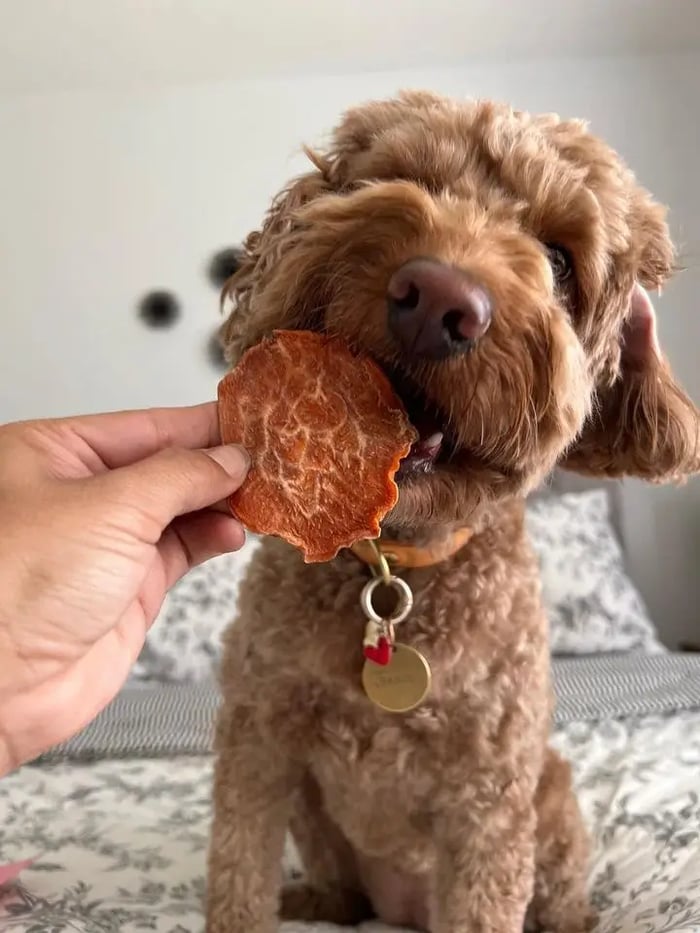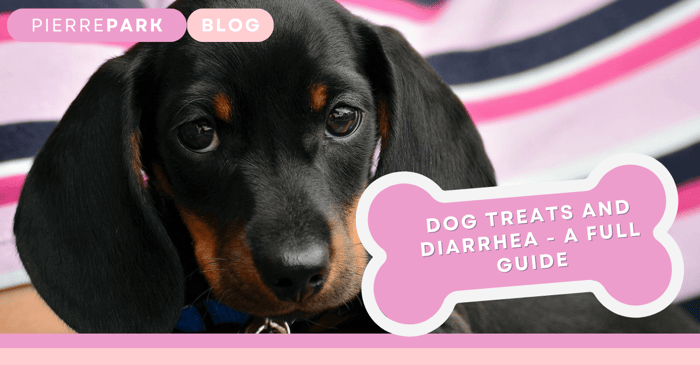Table of Contents
Vet-Approved

This article has been rigorously reviewed and validated by Dr. Annina Müller, med. vet., an accomplished veterinarian who earned her veterinary degree at the University of Bern, specializing in Small Animal Surgery. Her expertise ensures that the advice provided is both current and accurate in the field of veterinary medicine.
Yes, dog treats can cause diarrhea, even though it may seem like an uncommon occurrence. While offering your dog a delicious treat is a pleasurable experience for both the owner and the pet, it can quickly become problematic if the treats are not well-suited to your dog's digestive system, potentially leading to gastrointestinal issues such as diarrhea.
It is crucial to recognize that diarrhea resulting from dog treats is not always a consequence of overfeeding. There are several other factors that can contribute to this issue, which may not be readily apparent to pet owners.
In the subsequent sections, we will provide a thorough examination of the reasons why dog treats can cause diarrhea and explore the preventive measures that can be taken to mitigate this problem. By understanding the potential causes and implementing appropriate precautions, pet owners can ensure that their dogs remain healthy, content, and free from digestive discomfort while still enjoying the occasional treat.
The 5 Main Reasons Why Dog Treats Can Cause Diarrhea
Here are the five most common reasons why dog treats can cause your dog to have diarrhea.
1. Overfeeding
Overfeeding can cause your dog to suffer from diarrhea, especially with treats.
Dog treats are not designed to be nutritionally complete, which is why they have recommended feeding amounts according to the size of your dog.
If you feed them too much, it can upset their stomach quickly and cause diarrhea.
Always stick to the 10% rule, where 10% or less of the calories that your dog eats in a day should come from treats and the rest from their regular diet.
2. Low-Quality Dog Treats
It should be no surprise that not all dog treats are high quality.
In fact, many dog treats use filler ingredients and several chemicals to preserve the food, and these can cause stomach issues, especially if your dog is used to a higher-quality diet.
Our healthy dog treats were designed with quality and simplicity in mind and are a great example of a single ingredient dog treat that is stomach-friendly.

3. The Treats Are Expired
Alongside the concern about expired treats, it's important to be cautious with raw meat snacks. These can carry resistant bacteria and parasites, particularly if they're not fresh.
All dog treats, including raw meat snacks, have a best-by date, indicating when they start to degrade in quality. Feeding your dog these treats past their expiration can lead to stomach upset. This condition is sometimes referred to as garbage toxicosis or garbage gut, and is more common than one might think, especially with raw meat treats.
4. Allergy
Certain allergies can affect your dog's digestive system and cause vomiting and diarrhea.
The most common allergies for your dog to develop in terms of food are from proteins such as beef, chicken, and lamb, so if you have introduced a new dog treat to your dog with a protein that they haven't eaten before, it could cause an allergic reaction, leading to diarrhea.
5. Offering New Treats
The last reason why dog treats can often cause diarrhea for your dog is if you offer them a new brand or type of treat and they aren't used to the ingredients.
It can take a while for a dog to adapt to a change in their diet, especially if the dog treats contain a different protein from the one they are used to from their regular dry or wet food.
When offering your dog a new treat, start with smaller amounts than those recommended on the label to give your pup a chance to adapt to the new food.
What To Do If Your Dog Has Diarrhea From Dog Treats
If your dog has diarrhea and you suspect dog treats are the cause, they should be fine with a bit of rest. Follow the steps below to get your pup on the path to recovery as soon as possible.
If you're worried about your dog having diarrhea or if they start to show any other symptoms, consult your veterinarian.
Keep Your Dog Hydrated & Let Them Fast
When your dog has diarrhea, the best thing to do is to ensure they drink plenty of water to stay hydrated. For healthy, adult dogs, consider a brief fasting period of 6 to 12 hours, but avoid fasting for more than 12 hours. Puppies should not be fasted at all. Before you decide on fasting your dog, even for a short time, it's important to consult with your vet. They can give you the best advice tailored to your dog's specific health needs.
Stick To Bland Foods
Once your dog finishes fasting, start feeding them again but skip treats and any new foods they haven't tried recently.
Opt for plain, bland, and stomach-friendly options like plain cooked white rice or canned pumpkin. You could also consider dog food made specifically for sensitive stomachs, though these often need a prescription. Importantly, instead of their usual meal portions, offer these bland foods in small amounts but more frequently than usual. This approach can be gentler on your dog's digestive system as it recovers.
Consult Your Veterinarian If Symptoms Persist
If the symptoms of diarrhea are still present after the fasting period and your dog is rejecting foods that are more suited for a sensitive stomach, get in touch with your veterinarian.
Tips For Avoiding Diarrhea From Dog Treats
The last thing anybody wants is for their dog to get diarrhea after giving them a new dog treat.
Here are some easy tips to prevent your dog from getting diarrhea the next time you introduce them to a new dog treat.
Start With Small Amounts
The best thing you can do to avoid stomach problems with new dog treats is to start with very small amounts at first.
A good rule of thumb for this is half the recommended daily amount at first to see how their stomach reacts, making sure to give them plenty of time afterward to let the treats digest.
Check The Ingredient List
Carefully reviewing ingredient lists is essential when choosing dog treats. Many commercial treats contain extensive lists of additives, preservatives, and fillers that provide minimal nutritional value. These unnecessary ingredients can potentially impact your dog's health and digestion.
For detailed information about potentially harmful ingredients, we recommend reviewing our comprehensive guide: "15 Ingredients To Avoid In Dog Treats."
Single-ingredient treats offer a simpler, more transparent option. These treats, such as our dehydrated sweet potato treats, eliminate the uncertainty of complex ingredient lists. They provide natural nutrition without artificial additives or preservatives. Learn more about the benefits of single-ingredient treats in our detailed guide.
Make Sure The Treats Are Fresh
The last thing to do is to double-check that the treats you are offering are fresh and haven't gone stale or out of date.
Dog treats have a best-by date for a reason, and while it's relatively uncommon for them to cause issues if they're close to the date, those that are far past the best-by date can cause stomach problems.
Summary
Certain dog treats can be more prone to giving your dog diarrhea, especially if they are suddenly introduced to their diet in significant amounts.
If you stick to high-quality dog treats that don't contain lots of added preservatives or flavorings and introduce them in small amounts, your dog should be safe from getting diarrhea.






